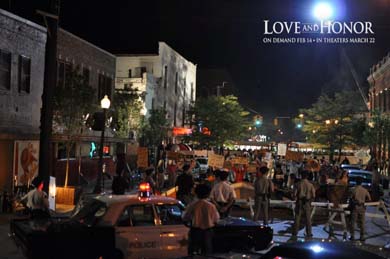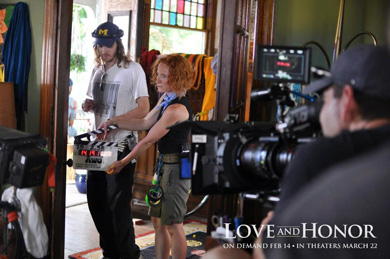The four of them stand in the evening light, focused, it seems, on the speaker addressing the crowd. But in reality, they are intensely aware of one another—two couples who have come together in the past few days, full of love, confusion, and painful choices.

An exterior shot recreates student unrest on South University in 1969. (Photo courtesy of IFC Films.)
They seem aware of and yet apart from the chaos all around them—hundreds of angry students swarming South University, bearing peace symbols and protest signs. The “speaker” is a fiery young man whose fist punctures the air as he lambasts the Vietnam War, the Establishment, the media, the moon landing, you name it. Meanwhile, law enforcement officers move in with riot gear and tear gas.
It is July, 1969. The Vietnam War is at its height, and so is the anti-war hysteria that seems so often to manifest in Ann Arbor. Everything seems to be blowing up.
But in this crowd, on this day, the real story is the four young people—two soldiers, two students—who just found out that love, and life, are not as simple as they once believed.
The above scene is exactly that—a scene from the new movie Love and Honor (IFC Films). Set against the backdrop of the 1969 riots on South University in the heart of U-M’s Central Campus—coinciding with the Apollo 11 moon landing mission July 16-23—the movie is about love and honor during war, not the war itself.
AWOL in A2
Events are set in motion when a young soldier serving in Vietnam decides to go AWOL upon receiving a Dear John letter from his girlfriend at U-M. His best buddy agrees to go with him. Their mission: Get to Ann Arbor, win back the girlfriend, and return to duty—all in one week.
“It’s a coming-of-age story in seven days,” says Michigan film grad and director Danny Mooney, BA ’08. “I really identified with the buddy character. He had done a bunch of things in his life, but never took any of them seriously, and suddenly, he takes everything seriously.”
The parallel stories of romantic love and comradeship are equally compelling. But, Mooney adds, the movie also appeals to members of the Vietnam War-era generation who remember—and possibly participated in—the war, the protests, and of course, the conflicted relationships that define youth.
The movie features some heavy-hitting talent: Liam Hemsworth (The Hunger Games); Teresa Palmer (Warm Bodies); Austin Stowell (Dolphin Tale); and Aimee Teegarden (Friday Night Lights). Already released in several foreign territories, the film is getting rave reviews.
But perhaps most important to U-M alumni, Love and Honor is “the most maize and blue movie ever made,” says executive producer Eddie Rubin, who received his BA in film and psychology in 2009.

The Love and Honor team in Ann Arbor: Pat Olson, Danny Mooney, Eddie Rubin, and Jim Burnstein. (Photo: Michigan Photography.)
That might be an understatement.
In 2011, the Love and Honor crew descended on Ann Arbor, Ypsilanti, and surrounding locations. They brought vintage police cars, a sweet convertible Mustang, and a plethora of period costumes. They were working with a screenplay written by Jim Burnstein BS ’72/MA ’74, and Garrett K. Schiff, who is based in Los Angeles. (Both also are executive producers.) Burnstein, meanwhile, is head of the screenwriting program in U-M’s Department of Screen Arts & Cultures. He works regularly in Hollywood with screenwriting credits that include Renaissance Man; D3: The Mighty Ducks; and Ruffian.
Peace, love, and understanding
“The movie has universal appeal,” Burnstein says of Love and Honor. “The emotions that young people go through and learning about things like commitment is timeless.”
Also important, Burnstein adds, is that the film does what the actual era did not. “I was in the anti-war movement back in ’69,” he says. “We knew what we thought about the war; and the soldiers knew what they thought. We just never were in the same place, and never got to see each other’s perspectives. What this movie allows, by these guys coming back, is for each side to learn about the other. And as they learn about each other, they change each other.”

Danny Mooney made the Block M part of his wardrobe as director. (Photo courtesy of IFC Films.)
Rubin, 26, and Mooney, 28, met at U-M in one of Burnstein’s classes. The two students clicked and created Deep Blue Pictures in 2008. They have produced several features. Love and Honor is their first film directed by Mooney.
Next on the U-M alumni/Love and Honor marquee is producer Patrick Olson, BS ’84, of Plymouth, Mich. The political science grad is an old friend of Burnstein’s and president of Plymouth-based Peninsula Films. “What I really love about the story is that it involves a number of relationships and those relationships evolve significantly,” Olson says.
About 20 U-M film program interns signed on to help throughout the production process, gaining valuable experience in the industry. U-M’s Film Office offered continual assistance.
And, to pile on the U-M connections: Screenwriter Schiff’s parents are both Michigan graduates; Rubin’s mother is an alum who actually participated in the protests the movie depicts; both of Mooney’s folks are alumni; Olson’s son is a U-M student; and Burnstein’s two older children are alumni, while his youngest son will graduate from the University in May.
Emerging from the trenches
Rubin and Mooney both say the experience was invaluable and life-changing. The two have become nearly inseparable; they are, in fact, conducting a self-confessed “bromance.”
As a young director on such a wide-ranging film that involved scores of people, Mooney says he learned that he takes a “building block” approach to directing. He has studied and performed most aspects of the trade and continues his acting career. “Having played so many roles, I could help every person. Films can fall through because directors don’t communicate like that. It’s like, can you coach a sport you never played?
“The misnomer about directors is that they are the be-all-end-all of every creative decision on the movie,” he continues. “I think a director is a member and collaborator for every single department of the film, instead. [The director] steers the ship.”
Rubin had the far less glamorous and trench-digging task of securing financing for the film, among his other duties. Working on Love and Honor taught him “that rejection and the word ‘no’ can only propel you harder. You should take failure as the greatest learning experience ever. We had several financiers fall apart, and I could have given up; I was 22. I just said, ‘Screw that. No, I’ll push even harder.’ As a producer you need that tenacity to hold on. I look back, and I can’t believe I kept going. Something inside said, ‘Just do it.'”
In many ways, this film’s title reflects the sentiments of those who made it. There is great affection and respect among the cast and crew. Burnstein praises Olson for actually learning about and being involved in every part of the film, working side by side with lead producer Chip Diggins, former senior executive at both Disney and Paramount.
Olson, in turn, points to such a generous comment “from the guy who wrote the script,” which Olson “fell in love with” at the get-go. Nearly everyone, including the Hollywood veterans, attended the wrap party, which testified to the tight-knit, family style of filmmaking the Love and Honor team achieved.
So now, it’s a matter of, well, packing theaters. Olson notes that marketing and promotion for Love and Honor reflects a new era, and that they are aggressively using social media, DirecTV, Video On Demand, and other vehicles to get the movie in front of people.
“We hope a lot of U-M alums will see it,” Olson says. “In fact, we hope every single one of them sees it.”
“Twice,” Burnstein adds.





Bill Mosby - '71, '77
I turned from ROTC to anti-war in 1969. Had signed up for the final two years already, so it amounted to rejecting my commission and serving two years enlisted after graduation. Changed my life in some important ways, not all of them good. But I’d do it again.
Reply
Charlie Oster - 1979 (Dental)
I was in ‘Nam in 1971 as a Marine grunt. I wasn’t savvy enough to know then what a terrible waste the entire Viet Nam conflict was. That’s one of the many eye openers I got in Ann Arbor. I also remember learning about Dioxin (Agent Orange) in pathology class; how awful it was for living creatures. I’m still not sure how that made me feel.
I’m so looking forward to the film. Go Blue.
Reply
Carol Casselman - 1973
Just watched the movie.
Very entertaining story with really good performances! Reminiscent of the intense relationships in college, the turmoil for young men who were subject to the draft and the many protest movements at U of M back then. (The campus unrest was not just due to the anti-Vietnam war rallies highlighted in the movie, but also to the Black Action Movement, John Sinclair’s Rainbow People’s Party, Students for a Democratic Society (SDS)…It was a wild period in Michigan history.)
Very good movie fellow Wolverines! Wishing you great success. Go Blue!
Reply
Henry Lowendorf - 1964
The modern antiwar movement began with Ban the Bomb marches in the late 1940’s. During the French war to recolonize Vietnam, President Eisenhower offered the French atomic bombs. Wisely declined. As students and others in the mid ’60’s learned of the U.S. aggression on Vietnam many expanded their own consciousness about U.S. foreign and military policies and built on the earlier movement. To refer to the outrage at our own government’s murderous actions as “anti-war hysteria” is an insult to everyone who decided to think outside the walls of our formal education and around the lies of the mass media. The word “hysteria” is more correctly applied to describe the cold war, the Tonkin Gulf Resolution, the assertion that Vietnam, along with Cambodia and Laos, which the Pentagon bombed into rubble and chaos, were ever a threat to our country, and the illegal and immoral actions of four administrations. Subsequent years have proven that war hysteria, not anti-war hysteria, still rules the United States of America.
Reply
Edwin Rennell Jr.
I graduated from the School of Dentistry in June, 1960, and immediately enlisted in the U.S. Army (they were still drafting us in those days). I was a Captain assigned to the 349th General Dispensary in Fontenet, France, for two years. Our biggest concern while I was in Europe was the Cuban Missile Crisis in October, 1962 (a different outcome could have precipitated WWIII). In 1969 I was practicing oral surgery in Livonia and have very little recollection of the student unrest in Ann Arbor (maybe I need to re-read some of the newspapers from that time). I’m really looking forward to the film.
Reply